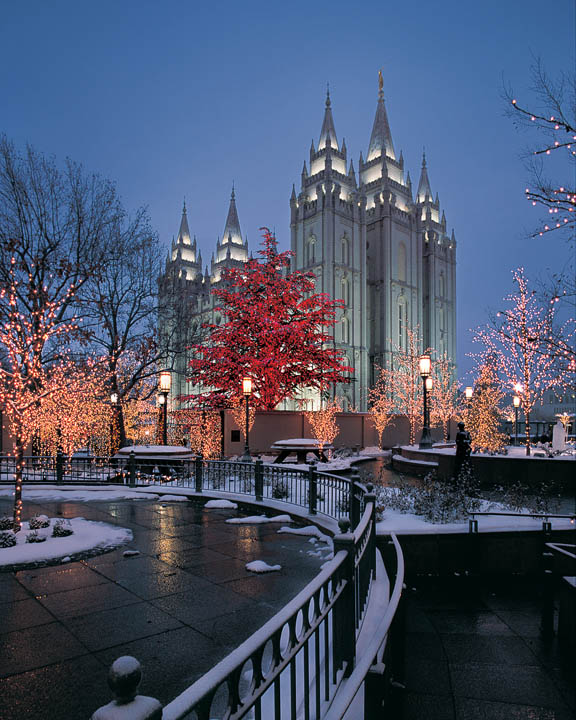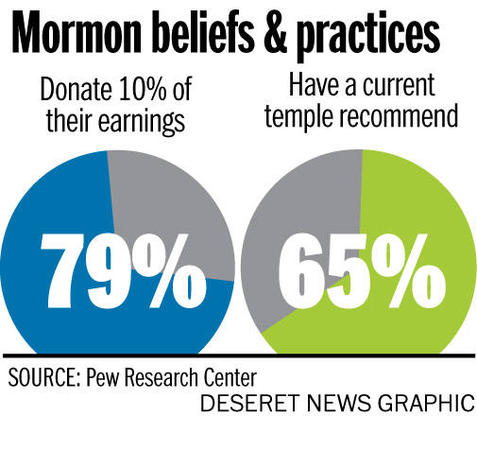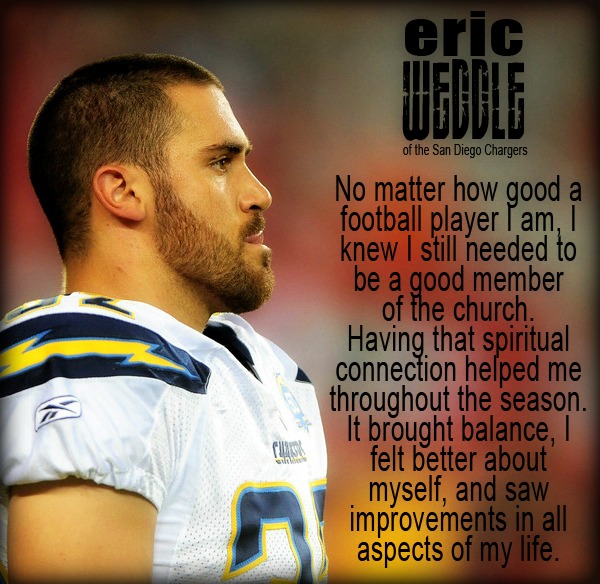The Pew Foundation survey of Mormons released this past week confirms that U.S. Mormons are more conservative (66 percent) compared to the general public (37 percent), and on most issues, they closely track white evangelicals. But immigration is one issue that sets Mormons apart from their evangelical counterparts.
 Asked whether immigrants are a strength or a burden, 59 percent of white evangelicals said they were a burden, while only 41 percent of Mormons felt the same, compared to 44 percent of the general public. The result is surprising given how staunchly conservative Mormons are on nearly every measure. Interestingly, 50 percent of white mainline Protestants and 49 percent of white Catholics also tilt against immigration, though neither group is as uniformly conservative as evangelicals or Mormons on other measures.
Asked whether immigrants are a strength or a burden, 59 percent of white evangelicals said they were a burden, while only 41 percent of Mormons felt the same, compared to 44 percent of the general public. The result is surprising given how staunchly conservative Mormons are on nearly every measure. Interestingly, 50 percent of white mainline Protestants and 49 percent of white Catholics also tilt against immigration, though neither group is as uniformly conservative as evangelicals or Mormons on other measures.
Dan Cox, Research Director at the Public Religion Research Institute in Washington, D.C. sees several reasons for the surprising result. He points first to demographics to explain why Mormons are more open to immigrants than are white evangelicals. “White evangelicals are significantly lower on the socioeconomic scale than most other religious groups. Those who are more economically vulnerable are more likely to see newcomers as threats,” he says.
The Pew results validate the socioeconomic explanation. The key is a strong link between Mormon religious commitment and socioeconomic status. Eighty-four percent of Mormon college graduates are highly committed to the Church, but just 50 percent of those with high school education share that same level of commitment. This socioeconomic gap also translates to immigration: 50 percent of less committed Mormons see immigrants as a burden, against 36 percent of highly committed Mormons.
Cox also points to age as a key factor, noting the surprising anti-immigration sentiment among mainline Protestants and white Catholics. “Both of these groups tend to be older than the general public,” Cox says, “and we find that younger people are much more open to immigration.” Sure enough, Pew finds that 49 percent of Mormons between the ages of 18-49 see immigrants as a strength, while just 39 percent Mormons over 50 say the same. The Mormon youth movement has an impact on the results: according to a 2009 Pew study, 41 percent of the general population was over fifty years old, while just 34% of Mormons fall into that category.
Cox also thinks culture is a factor in the Mormon tendency to be more tolerant of immigrants, citing in particular the outward focus of the LDS church and the percolating influence of missionaries returning from foreign lands. “When you have more interaction with someone,” Cox notes, “you have increased comfort with them.” One statistic conveys the impact of this element of Mormon culture: 70 percent of the 33,000 students at BYU are bilingual.
Theresa Martinez, a non-Mormon sociology professor at the University of Utah, emphatically seconds Cox on the outward focus. “I’ve taught over 7,000 students,” she says, “probably about half of them LDS, with a large proportion of those return missionaries, and half of those from Latin American missions.” Her students express strong attachment to the peoples and communities they served, Martinez says. “And after that, you are not the sheltered little Mormon kid, and you understand that life is much bigger than your backyard.”
While the seeds of openness are embedded in the culture, others note that Church leaders recently gave a gentle push in that direction. Last year Utah illegal immigration hard-liners were poised to copy Arizona’s stern immigration policies, when centrists—with quiet but clear support from Church leaders—turned tables with widely-noted legislation that will allow some undocumented workers to obtain drivers’ licenses and work. In the fall of 2010, the Church also stated support for the principles of the The Utah Compact, which urges humane and measured solutions at the federal level.
 And yet, divisions within the LDS community remain. Utah House Rep. Chris Herrod of Provo, a leader on anti-illegal immigration efforts in Utah, considers himself pro-immigration, noting that his wife is from Ukraine, his sister-in-law from Korea, and his business partner from Ethiopia.
And yet, divisions within the LDS community remain. Utah House Rep. Chris Herrod of Provo, a leader on anti-illegal immigration efforts in Utah, considers himself pro-immigration, noting that his wife is from Ukraine, his sister-in-law from Korea, and his business partner from Ethiopia.
Herrod points out that the Pew study addresses immigration per se, rather than illegal immigration, and says he has often been puzzled when debates on the two issues become muddled. “I believe in immigration,” he says. “It’s the melting pot that has made the country great. But lately we seem to be splitting into a bilingual and bicultural nation. We need to give equal chances to Africans, Asians, South Asians, and Eastern Europeans, and we need to get back to those core beliefs, where you adopt the language and blend the cultures.”
Richard Davis, a political science professor at Brigham Young University, sees the Church position last summer as impacting dialog on this issue within Utah and among U.S. Mormons. “For years the drumbeat was all about illegal immigration and the need to enforce the law,” he says. “The Church has nudged the agenda. Now it’s more about how we treat people, however they got here.”
Charles Morgan, a BYU sociologist who studies immigration, sees culture and Church positioning as mutually reinforcing. Morgan notes that the “closer the contact you have with a group, the more likely you are to have compassion and see them as equals.” Like Davis, Morgan also sees the Church’s positioning as significant: “The Church is projecting a positive image of immigrants, and I think this is resonating with the more devout Mormons.”
Morgan points to Arizona, where a Mormon state senator from the heavily Mormon Mesa area, who was president of the Senate and had authored the state’s controversial immigration policy, was replaced in November by another Mormon in a recall election. The new senator, Jerry Lewis, was encouraged to run by LDS members in the Mesa area who were concerned with what they saw as a harsh tone on illegal immigration.
Jason Labau, who researches Arizona political history at the University of Southern California, also sees recent Church policy and underlying cultural factors as reinforcing. “This is a much longer shift,” he says, “and it stems from the missionary experience. Several friends I grew up with in Arizona are staunchly conservative, and the only issue we see eye to eye on is immigration. They served missions in Chile, Guatemala, and Mexico, and they see these people as equals who are looking for something better.”
Eric Schulzke is the director of the Apollo 13 Project (a13.org), a prisoner reentry initiative based at Utah Valley University. He can be reached at eric[at]a13.org.
Additional Resources:
Mormon attitudes on immigration
Full Series Mormon Pew Study: Mormons in America






